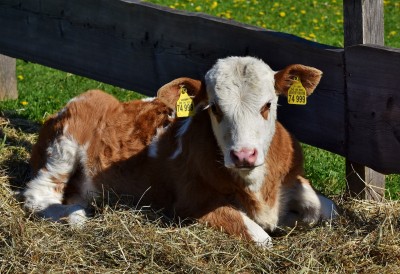Raising the Orphan Calf, by Dr. Rosslyn Biggs

Raising The Orphan Calf
Rosslyn Biggs, Oklahoma State University State Extension Beef Veterinarian
Raising an orphaned beef calf can be time consuming and may require additional expense. Additionally, calves may not be thriving at the time they are orphaned so managing health and nutrition can present challenges. Below are considerations when creating a plan.
Nutrition
Age has significant influence on the nutritional considerations for an orphaned calf. High quality colostrum should be fed to calves that lose their dams at less than 24 hours of age. Producers should not wait to administer colostrum if there is evidence the calf has not nursed.
Beyond the first day of life, calves need 10-12% of their body weight in milk per day. A good rule of thumb is that one gallon of milk equals eight pounds. Feeding multiple times per day from a bottle or bucket are both options, however, nursing from a bottle closely mimics the nursing of the udder.
The quality of a milk replacer is critical, and the calf should be consistently fed with the same product. Milk replacers should, at a minimum, be at least 15% fat and 22% protein. Milk should be at 101-105 degrees F when fed.
Within the first week after birth, offer a calf starter ration of pellets or other creep feed along with high quality hay. Once the calf is beginning to consume ½ to 2 pounds of dry feed daily, slow bottle weaning can be initiated. Unlike in dairy calves, best results are seen if a beef calf is fed milk for several months. At eight weeks of age, the calf's weight should have double since birth.
Fresh water should be always available. Water buckets, bottles, and feed pans should be regularly cleaned and sanitized.
Temperature
Calves, especially newborns, do not have the ability to easily maintain their core temperatures. Environmental conditions such as wind and outside temperatures below 50 degrees F may lead to cold stress. Especially during the winter, calves may need to be taken indoors for rewarming and fluids if their temperature drops below 99 degrees F.
Bedding can also help maintain calf temperature. Deep bedding such as straw should be available and regularly refreshed. Housing should be well ventilated areas, clean, and dry.
Health
Fever, decreased appetite, coughing, and diarrhea can all be clinical signs of concern. Producers should work with their veterinarians in advance to develop treatment plans and have medications on hand for commonly seen conditions.
Upcoming Events
NYSDEC How to Get Certified Course
March 3, 2026 : NYSDEC How to Get Certified Course
Ellicottville, NY
NYSDEC training course in preparation to take the pesticide applicator exam.
From Data to Dollars: Making Data-driven Decisions to Increase Farmers Market Success
March 3, 2026
The Cornell Agricultural Marketing Research Program and Penn State University are excited to present this new, 6-week course as part of Cornell's Farmers Market Research Project. The course is for farmers with experience selling at farmers markets who wish to increase their earnings through management and marketing practices.
Cornell Organic Field Crops & Dairy Conference
March 6, 2026
Waterloo, NY
Farmers, researchers, educators, and agricultural service providers from across the Northeast are invited to the 2026 Cornell Organic Field Crops & Dairy Conference, held Friday, March 6, 2026, from 8:00 a.m. to 4:30 p.m. at the Lux Hotel & Conference Center in Waterloo, N.Y.
Co-hosted by New York Soil Health and Cornell CALS, the annual conference brings together leaders in organic grain, dairy, and livestock systems to share practical tools, new research, and farmer-tested strategies to support resilient and profitable organic production.
Announcements
No announcements at this time.





